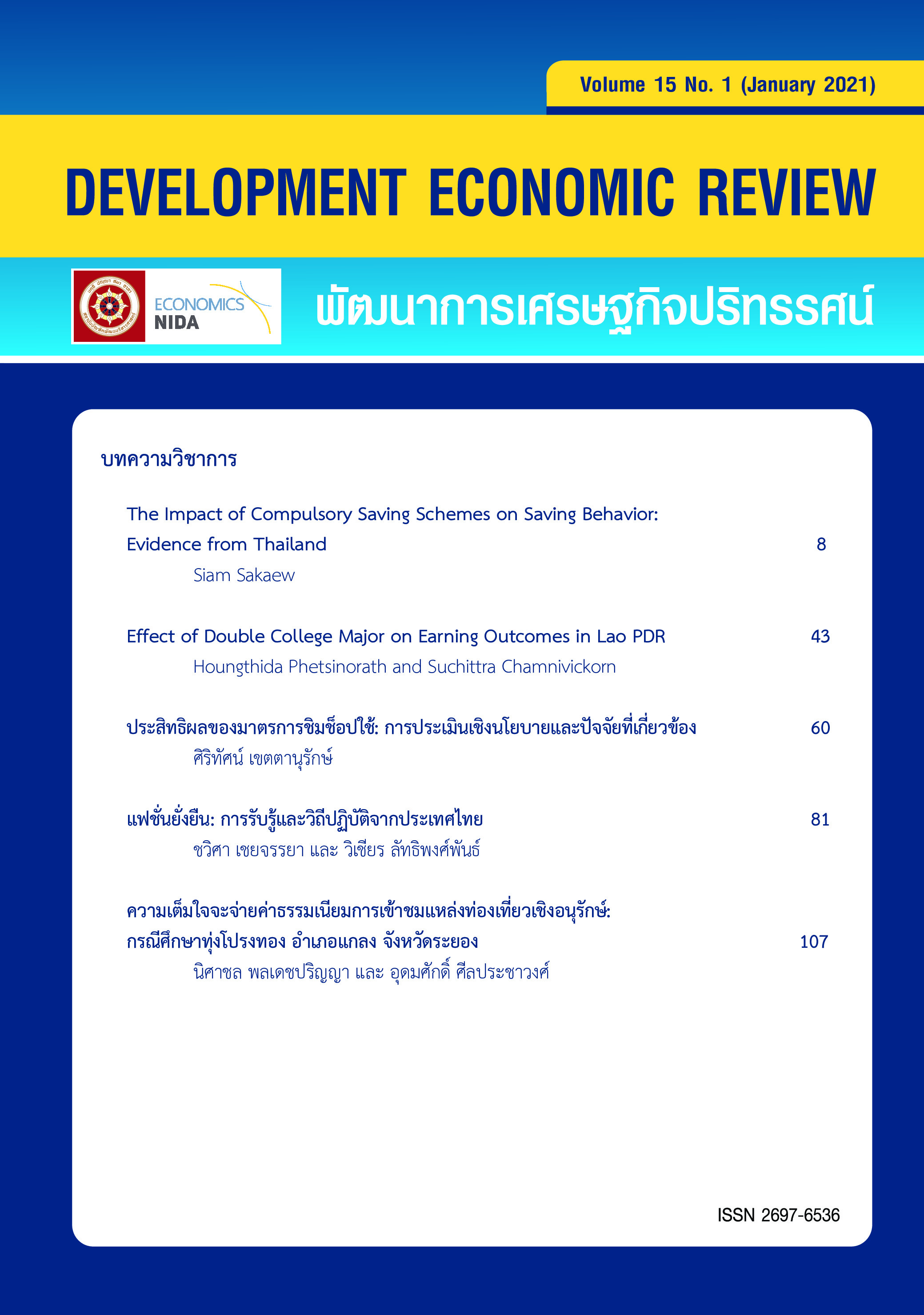Effect of Double College Major on Earning Outcomes in Lao PDR
Keywords:
Double Major, Human Capital, Individual Earning, Mincerian Equation, Lao PDRAbstract
Based on Human capital Theory that investment in schooling is the main determination on individual future earning, this study aims to show further study the effects of double major (degree) on individual earning by using Lao PDR as case study. Using raw data set from the World Bank Skills toward Employability and Productivity (STEP) Measurement Program 2012, our results show that graduates with double major earn do not have any effects on individual earnings. One possible reason is that an additional major (degree) may not be the key factor to determine additional wage paid in Lao’s labor market. There is only those with college/ university degree double major in social science/education that are found to be statistically significant on higher earning outcomes.
References
Carnevale, A.P., Strohl, J., & Melton, M. (2011). What’s it Worth?: The Economic Value of College Majors, Center on Education and the Workforce, Georgetown University, retrieved from https://1gyhoq479ufd3yna29x7ubjn-wpengine.netdna-ssl.com/wp-content/uploads/2014/11/whatsitworth-complete.pdf
Del Rossi, A.F. & Hersch, J. (2008). Double Your Major, Double your Return?. Economics of Education Review, 27(4), 375–386.
Hemelt, S.W. (2010). The College Double Major and subsequent earnings. Education Economics, 18(2), 167–189.
Duronsoy, J., Syvilay, V., & Billany, N. (2014). Report on Employers’ Survey Related to Higher Education Graduates’ Employment Issues in Lao PDR, Strengthening Higher Education Project., Vientiane: Asian Development Bank.
Jiang, S. (2016). Esseys on College Majors, College Curriculum, and Subsequent Labor Market Outcomes. Doctoral Disseration, Department of Economics, the Ohio State University
Lewin, T. (2002). For Students Seeking Edge, One Major just isn’t Enough. New York Times, November 17, 2002, retrieved from https://www.nytimes.com/2002/11/17/us/for-studentsseeking-edge-one-major-just-isn-t-enough.html
Mincer, J. (1974a). The Human Capital Earnings Function, retrievded from https://www.nber.org/system/files/chapters/c1767/c1767.pdf
Mincer, J. (1974b). Age and Experience Profiles of Earnings. Schooling, Experience, and Earnings, retrieved from https://www.nber.org/books-and-chapters/schooling-experience-and-earnings
Onphanhdala, P. & Suruga, T. (2006). Education and earnings in Lao PDR: Regional and Gender Differences, GSICS Working Paper Serie 4, Kobe: Kobe University.
Russell, A.W., Dolnicar, S., & Ayoub, M. (2008). Double Degrees: Double the Trouble or Twice the Return?. Higher Education, 55(5), 575–591.
Schultz, T.W. (1961). Investment in Human Capital. American Economic Review, 51(1), 1-17.
Becker, S.G. (1993). Human Capital: A Theoretical and Empirical Analysis, with Special Reference to Education, Chicago: University of Chicago Press.
Tangtipongkul, K. (2015). Rates of Return to Schooling in Thailand. Asian Development Review, 32(2), 38–64.
Toh, M.H., & Wong, C.S. (1999). Rates of Return to Education in Singapore. Education Economics, 7(3), 235–252.
World Bank. (2013). Skills for Quality Jobs and Development in Lao. A Technical Assessment of the Current Context. Vientiane: The World Bank.
World Bank. (2016). Lao Economic Monitor: Challenges in Promoting more Inclusive Growth and Shared Prosperity, Vientiane: The World Bank. World Economics Forum. (2016). Human capital outlook: Association of Southeast Asian Nations (ASEAN). Kuala Lumpur: World Economics Forum, retreived from http://www3.weforum.org/docs/WEF_ASEAN_HumanCapitalOutlook.pdf

Downloads
Published
Issue
Section
License
Copyright to published manuscripts becomes the property of the Graduate School of Development Economics, National Institute of Development Administration. Reproduction of all or part of a Development Economic Review (DER) article by anyone, excluding author(s), is prohibited, unless receiving our permission.
Disclaimer: Opinions expressed in articles published in this journal are those of the author (s) and do nto necessarily represent opinions of the Graduate School of Development Economics, National Institute of Development Administration. Trade and proprietary names are only for identification and not constitute our endorsement.

